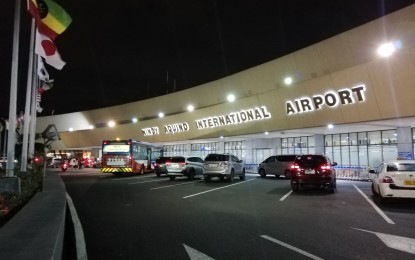
File photo
MANILA – The Philippines has barred entry of travelers from India or with travel history to India in the last 14 days to prevent the transmission of a "double mutant" coronavirus strain, Malacañang announced Tuesday night.
“All travelers coming from India or those with travel history to India within the last 14 days preceding arrival shall be prohibited from entering the Philippines beginning 0001H of April 29, 2021, until May 14, 2021,” Presidential Spokesperson Harry Roque said in a press statement.
Passengers already in transit from India and all those who have been there within 14 days immediately preceding arrival to the Philippines who arrive before April 29, 2021 shall not be subject to the travel restriction.
However, they will be required to undergo 14-day facility-based quarantine period despite acquiring a negative reverse transcription-polymerase chain reaction (RT-PCR) result.
Roque said restrictions to travelers coming from other countries that report the new strain may be imposed by the Office of the President upon the joint recommendation of the Department of Health (DOH) and the Department of Foreign Affairs (DFA).
He said the Department of Transportation (DOTr) should ensure that airlines are directed to prohibit the boarding of passengers entering the country except if they are part of the repatriation efforts of the national government.
Currently, foreigners, except diplomats and healthcare workers, are still barred from entering the Philippines.
Foreign parents, spouses, and children of Filipinos may enter the country, provided they are traveling with the Filipino principal, and have a valid entry.
In a tweet on Tuesday afternoon, DFA Secretary Teodoro "Teddyboy" Locsin Jr. said he recommended a travel ban on visitors from the entire Indian subcontinent.
"I have suggested to the IATF (Inter-Agency Task Force for the Management of Emerging Infectious Diseases) that a travel ban be imposed on all our good friends in the entire Indian subcontinent; it’s not personal; it’s for everyone’s safety for now; we’ll be able to be together again and we can recall the time when we had to be apart to live," he said.
The Indian subcontinent covers India, Nepal, Bangladesh, Pakistan, Bhutan, and the island nations of Sri Lanka and Maldives.
Philippine Ambassador in New Delhi Ramon Bagatsing Jr., in a virtual presser, said the Covid-19 situation in India is "very serious".
In March, India announced that a new variant had been identified in samples of saliva taken from people in Maharashtra, Delhi and Punjab after a month of seeing a surge in cases of Covid-19 across the country.
The variant is known as B.1.617 and has two unusual mutations: E484Q and L425R.
The World Health Organization (WHO) classified B.1.617 as a "variant of interest.”
Other virus strains such as B.1.1.7, first identified in Britain; B.1.351, which was discovered in South Africa; and P1, found in Brazil, are "variants of concern" for the WHO.
On Tuesday, India's Covid-19 tally rose to 17,636,307 with 323,144 new cases recorded in the past 24 hours, said the federal health ministry.
According to xinhuatnet.com report, it was the sixth consecutive day when over 300,000 cases were registered in a single day in India, though there was a fall of nearly 30,000 new cases in a day compared to those reported on Monday.
The federal health ministry also reported that 2,771 deaths took place in the past 24 hours, taking the total death toll to 197,894.
There are still a total of 2,882,204 active cases in the country, with an increase of 68,546 active cases through Monday, while 14,556,209 people have been cured and discharged from hospitals so far across the country. (PNA)
